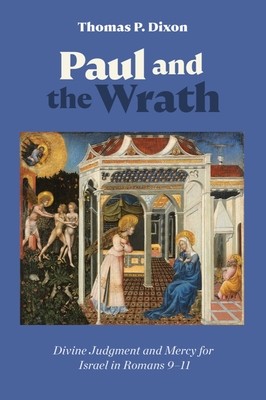
- We will send in 10–14 business days.
- Author: Thomas P Dixon
- Publisher: Baylor University Press
- ISBN-10: 1481321358
- ISBN-13: 9781481321358
- Format: 16.3 x 24.4 x 3.6 cm, kieti viršeliai
- Language: English
- SAVE -10% with code: EXTRA
Reviews
Description
Romans 9-11 is one of the most controversial passages in Paul's corpus. Efforts to reconcile chapter 9 with chapter 11 are disparate, and the dearth of scholarly interest in the subject of wrath often perpetuates the Marcionite premise that wrath precludes mercy, a false antithesis that was foreign to Paul and especially skews interpretation of Romans. This presumed opposition leads scholars to find dithering dialectic, incompatible covenants, two Israels, or contradictory fantasy in Romans 9-11. How can a passage at the heart of the apostle's greatest letter have become so muddled?
To help clear the fog, Paul and the Wrath replaces the simplistic wrath-mercy binary with a thicker, overlooked, and distinctly Jewish lens of remedial wrath, clarifying Paul's argument that God judges Israel in order to save Israel. To configure this lens properly, Thomas Dixon outlines a taxonomy of views on divine wrath and mercy around four ancient, representative interpreters, then surveys philosophies of wrath in Greco-Roman literature before examining a swathe of images in biblical and extrabiblical Jewish texts in which judgment advances mercy. The frequency of such imagery in these Jewish sources establishes a plausibility structure for finding similar theology in Paul, which leads Dixon to a new evaluation of Paul's argumentative logic in Romans 9-11 and elsewhere.
This Jewish theology of judgment provides a wider window that can shed light on--and help resolve--a persistent division in Pauline scholarship over the apostle's understanding of mercy, works, and atonement. Paul and the Wrath offers clarity in a clouded arena of Pauline theology in order to foster more faithful reading of both Paul and Scripture as a whole.
EXTRA 10 % discount with code: EXTRA
The promotion ends in 23d.01:07:23
The discount code is valid when purchasing from 10 €. Discounts do not stack.
- Author: Thomas P Dixon
- Publisher: Baylor University Press
- ISBN-10: 1481321358
- ISBN-13: 9781481321358
- Format: 16.3 x 24.4 x 3.6 cm, kieti viršeliai
- Language: English English
Romans 9-11 is one of the most controversial passages in Paul's corpus. Efforts to reconcile chapter 9 with chapter 11 are disparate, and the dearth of scholarly interest in the subject of wrath often perpetuates the Marcionite premise that wrath precludes mercy, a false antithesis that was foreign to Paul and especially skews interpretation of Romans. This presumed opposition leads scholars to find dithering dialectic, incompatible covenants, two Israels, or contradictory fantasy in Romans 9-11. How can a passage at the heart of the apostle's greatest letter have become so muddled?
To help clear the fog, Paul and the Wrath replaces the simplistic wrath-mercy binary with a thicker, overlooked, and distinctly Jewish lens of remedial wrath, clarifying Paul's argument that God judges Israel in order to save Israel. To configure this lens properly, Thomas Dixon outlines a taxonomy of views on divine wrath and mercy around four ancient, representative interpreters, then surveys philosophies of wrath in Greco-Roman literature before examining a swathe of images in biblical and extrabiblical Jewish texts in which judgment advances mercy. The frequency of such imagery in these Jewish sources establishes a plausibility structure for finding similar theology in Paul, which leads Dixon to a new evaluation of Paul's argumentative logic in Romans 9-11 and elsewhere.
This Jewish theology of judgment provides a wider window that can shed light on--and help resolve--a persistent division in Pauline scholarship over the apostle's understanding of mercy, works, and atonement. Paul and the Wrath offers clarity in a clouded arena of Pauline theology in order to foster more faithful reading of both Paul and Scripture as a whole.


Reviews